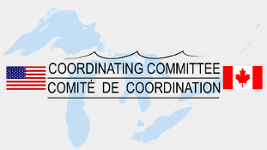The Coordinating Committee on Great Lakes Basic Hydraulic and Hydrologic Data (Coordinating Committee) is a collaboration of the Governments of the United States and Canada for the purpose of agreeing upon the basic hydraulic, hydrologic and vertical control data that is required to manage the Great Lakes and St. Lawrence River.
The Great Lakes – St. Lawrence River System extends from the headwaters of tributary streams in northern Minnesota and western Ontario, to the Gulf of St. Lawrence in the Atlantic Ocean. The drainage basin covers more than 1,000,000 km2 (400,000 square miles) from Duluth, MN to Trois Rivières, QC. Eight U.S. states and two Canadian provinces border this vast system of shared waters. Joint use of these waters by the people of Canada, the United States, First Nations and Native Americans, requires internationally-coordinated basic hydraulic, hydrologic and vertical control data.
The Coordinating Committee was established in 1953. Prior to that time, responsible Federal agencies in Canada and the United States independently collected and compiled data pertaining to the hydraulic and hydrologic characteristics of the Great Lakes and St. Lawrence River, with only superficial and informal coordination of some of the data. As a consequence, the same basic data developed on different bases and datum planes, were often not compatible. Representatives from the Federal Governments of the United States and Canada agreed to form a Coordinating Committee to rectify the situation. Since that time, the Coordinating Committee has been working to discuss and coordinate basic Great Lakes and St. Lawrence River water resource data collection, computation, archiving and distribution.
On this website you will find information relating to the Coordinating Committee and its history. You will also find information on the datasets and methods that are coordinated, publications of the Coordinating Committee and its current membership.
The following agencies currently support the Coordinating Committee:
United States Army Corps of Engineers (http://www.usace.army.mil/)
Environment and Climate Change Canada (http://www.ec.gc.ca/)
National Oceanic and Atmospheric Administration (http://www.noaa.gov/)
National Resources Canada (http://www.nrcan.gc.ca/)
United States Geological Survey (https://www.usgs.gov/)
Department of Fisheries and Oceans Canada (http://www.dfo-mpo.gc.ca/)
 Great Lakes Coordinating Committee
Great Lakes Coordinating Committee